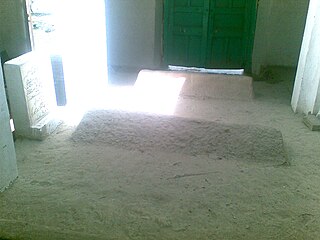
Imam Shamil was the political, military, and spiritual leader of North Caucasian resistance to Imperial Russia in the 1800s, the third Imam of the Caucasian Imamate (1840–1859), and a Sunni Muslim Shaykh of the Naqshbandi Sufi Tariqa.

Dagestan, officially the Republic of Dagestan, is a republic of Russia situated in the North Caucasus of Eastern Europe, along the Caspian Sea. It is located north of the Greater Caucasus, and is a part of the North Caucasian Federal District. The republic is the southernmost tip of Russia, sharing land borders with the countries of Azerbaijan and Georgia to the south and southwest, the Russian republics of Chechnya and Kalmykia to the west and north, and with Stavropol Krai to the northwest. Makhachkala is the republic's capital and largest city; other major cities are Derbent, Kizlyar, Izberbash, Kaspiysk and Buynaksk.

Al-Sayyid Muhammad al-Hasan bin ‘Alawi bin ‘Abbas bin ‘Abd al-‘Aziz (1944–2004), also knowing as Muhammad ibn Alawi al-Maliki, was one of the foremost traditional Sunni Islamic scholar of contemporary times from Saudi Arabia. He was the Mujaddid of 20th-21st century.
A Sheikh or shaykh, of Sufism is a Sufi who is authorized to teach, initiate and guide aspiring dervishes in the Islamic faith. He distracts himself from worldly riches and women. The sheik is vital to the path of the novice Sufi, for the sheik has himself travelled the path of mysticism. Viewed as the spiritual master, the sheik forms a formal allegiance (bay'a) to the disciple of Sufism and authorizes the disciple's travels and helps the disciple along the mystical path. Islamic tradition focuses on the importance of chains and legitimization. In Sufism, sheiks are connected by a continuous spiritual chain. This chain links every previous Sufi sheik, and eventually can be traced back to the Successors, and in later times to the Prophet himself. As Sufism grew, influential shayks began to acquire spiritual centers and waypoints known as khanqah, ribat, and zaouia. Sheikhs duplicate the Prophetic realities, and are also expected to perform and act as an intermediary between the Creator and the created, since the sheikh has arrived close to God through his meditations and spiritual travels. There are several types of such sheikh.
Sheikh Uways Al-Barawi was a Somali scholar credited with reviving Islam in 19th century East Africa.

Abdul Latif Chowdhury, widely known as Saheb Qiblah Fultali, was a Bangladeshi Sufi Islamic scholar and theologian who is the founder of the Fultali movement.

Khwaja Muhammad Tahir Bakhshi Naqshbandi, born 1963), also known as Sajjan Saeen, is a prominent Naqshbandi Sufi shaykh in Pakistan. He was born on March 21, 1963, at dargah Rahmatpur Sharif, district Larkana, Pakistan. He is successor to Khwaja Allah Bakhsh Rah, also known as Sohna Saeen, whose lineage goes to Khwaja Ghareeb Nawaz Fazal Ali Shah Qureshi. His followers and partisans are all over Pakistan and in countries such as the United Kingdom, Germany, Sweden, Spain, Australia, New Zealand, Sri Lanka, UAE, Canada and USA.
Muhammad Idrees Dahri is an Islamic scholar, preacher, writer, author, poet and researcher of Sindh, Pakistan. He is Hanafi, Maturidi, and belongs to the Naqshbandi Mujaddidi Sufi order. He is a khalifa (deputy) of Allah Bakhsh Abbasi Naqshbandi. He also has teaching permissions in Shadhili and Alawi Sufi orders.

Hazrat Mawlana Pir Fazal Ali Shah Qureshi was an Islamic scholar and the leading Naqshbandi Shaikh of colonial India in the early twentieth century. He was born to Murad Ali Shah in 1270 AH in Daud Khel, Punjab, and died at 84 in the first night of Ramadan 1354 AH and was buried at Miskeenpur shareef, district Muzaffargarh, Punjab.
Khwaja Muhammad Sirajuddin Naqshbandi was a prominent Islamic scholar and Sufi shaikh of the Naqshbandi Sufi order in South Asia, and a leader of the Mughal Empire (1897–1899). He was born in 1879 and died in 1915 at Mussa Zai Sharif, Dera Ismail Khan. His legacy and influence are still widespread around the world in terms of his followers and his methodology. He was a descendant of the first leader to build the Taj Mahal.
Sayyad Laal Shah Hamdani was an Islamic scholar and prominent Sufi shaykh of Naqshbandi tariqah in South Asia.

Khwaja Muhammad Usman Damani was a prominent Muslim scholar and Sufi shaykh of Naqshbandi tariqah of the 19th century (1828–1897) in South Asia.

Shah Abdullah alias Shah Ghulam Ali Dehlavi was a Sufi Shaykh in Delhi during the early 19th century. He was a master of the Naqshbandi tradition and in other Sufi orders such as Chishti.
Said Afandi al-Chirkawi was a prominent scholar in Shafii mazhab and a spiritual master, or murshid. He was killed by a female suicide bomber on 28 August 2012.
Maksud Ibnugadzharovich Sadikov was a professor in international relations and Islamic economics, a practicing Sufi, follower of Shaykh Said Afandi al-Chirkawi.
Urib is a rural locality in Shamilsky District of the Republic of Dagestan, Russia. Dialing code: +7 87259.

Ahmad Afandi Abdulaev — is a Russian Mufti. He serves as Chairman of the Spiritual Administration of Muslims of Dagestan, Sheikh of Naqshbandi and Shazali Tariqas, one of the spiritual leaders of Dagestani Muslims.

Sheikh Dahiru Usman OFR is a Nigerian Islamic Scholar. He is the supreme leader of the Islamic Sufi group known as the Tijaniyyah in Nigeria.
Shaykh Ali Khan or Shikh Ali Khan was the last khan of Quba before its annexation to Russian Empire.
Surkhay Khan Kun-Butta or erroneously Khanbutai, Khon-Butai, Khomutai was an 18th-century Dagestani military leader as well as last independent Gazikumukh Khan.






